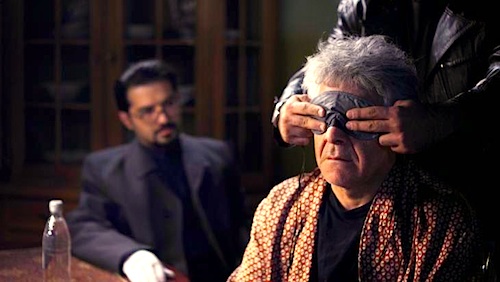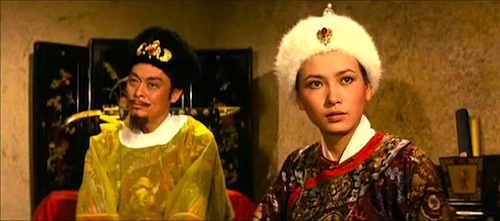By Joe Bendel. It was a dirty war Iran launched against itself. From 1988 through 1998, over eighty writers and reformist intellectuals are now thought to have been assassinated at the behest of high-ranking clerics and intelligence officials. Eventually, the nebulous outlines of the conspiracy were exposed by journalists subsequently railroaded on dubious criminal charges. Tackling the so-called Chain Murders (or events very much like them) would be a perilous course of action for any Iranian filmmaker hoping for official sanction, but as it happens, Mohammad Rasoulof has already been sentenced to a twenty year filmmaking ban. Produced entirely underground, Rasoulof’s Manuscripts Don’t Burn is a jaw-dropping feat of artistic integrity, which opens a week long engagement at MoMA this Friday.
Khosrow and Morteza are blue collar workers. They abduct, torture, and assassinate intellectuals thought to hold counter-revolutionary ideas by their Islamist masters, especially those looking to publish their work. The memoir of dissident writer Kasra would be particularly incendiary because it addresses the role played by the current intelligence minister in the attempted assassination of twenty-one public intellectuals on their way to a writers’ conference in Armenia.
In an effort to protect his manuscript, Kasra has sent copies to two of his lucky intelligentsia friends. Unfortunately, the secret police already have this intel, so Khosrow and Morteza are soon dispatched to torture the poet Kian and eventually fake his suicide. It is an assignment that comes at a bad time for Khosrow. Unlike the more mercenary Morteza, he fervently believes in the righteousness of the state ideology. However, his wife is convinced their son’s severe health issues are a form of divine retribution for the crimes he has committed. To make matters worse, the apparatus of terror has been slow to make the payments he so desperately needs for his son’s surgery.
The word bold just does not do Burn justice. Rasoulof shines a spotlight on censorship, torture, state-sponsored murder, and religious hypocrisy, all of which look even worse than one would imagine. If he missed a third rail, it would have to be the condition of women under the misogynist regime, but Burn offers more than enough to process as it is. Employing a cast and crew of expatriate Iranians, all of whom remain uncredited for their protection, Rasoulof’s film feels relentlessly authentic. Yet, despite the power of its indictment, Burn still functions as a taut political thriller.

Hopefully, one day soon we will safely know the identity of Rasoulof’s artistic collaborators. For now, we can only give them a collective ovation, but the fearless actor playing Kian deserves special mention. The Academy and its brethren should review their bylaws regarding anonymous work, because his performance as the suave, world weary poet truly merits award consideration. Likewise, the screen thesp cast as Khosrow creates a deeply riveting portrait of guilt and fanaticism, making it impossible to dismiss the film as mere polemics.
Like the work Jafar Panahi produced in defiance of his own filmmaking ban, Burn is about as independent as a film can get. It is also a masterwork from an accomplished artist. The allusion to Mikhail Bulgakov makes it even timelier, given Russia’s recent military adventurism with respects to its former Soviet era captive nations. Tragically though, the title is rather ironic—manuscripts really do burn—and so do writers. Very highly recommended, Manuscripts Don’t Burn opens this Friday (6/13) at MoMA, as part of their ongoing ContemporAsian film series.
LFM GRADE: A
Posted on June 12th, 2014 at 8:24pm.






